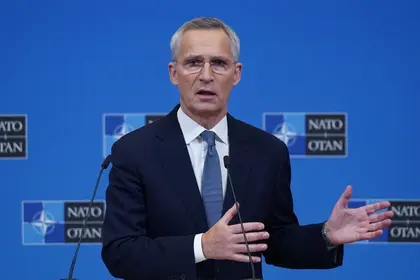NATO’s Secretary General has said he believes Russia “has lost Ukraine forever” as a result of its full-scale invasion and is no longer capable of achieving its war aims.
Speaking to the German news agency DPA, Jens Stoltenberg added this marked a “big strategic defeat for Russia.”
JOIN US ON TELEGRAM
Follow our coverage of the war on the @Kyivpost_official.
“The whole purpose of this invasion was to prevent Ukraine from moving towards NATO and the European Union,” he said.
“Ukraine is now closer to NATO and the European Union than ever before.”
But officials in Kyiv urged caution in making such bold declarations, suggesting that despite President Putin not achieving his goals during the 22 months of the full-scale invasion, this does not mean he has given up.
Representative of the Main Directorate of Intelligence (HUR), Vadym Skibitsky, said on Friday: “The goals that Putin set for himself regarding the so-called "special military operation” were not achieved either in 2022 or 2023.
“He simply transfers them to the next year.”
Skibitsky said the two things the Kremlin fears the most are a “change of regime in Moscow” and “the fragmentation or disintegration of the Russian Federation.”
He added: “Accordingly, in order to preserve this, Russia pursues such a policy as it is today.”
His comments were supported by the Institute for the Study of War, which wrote on Friday evening: “Skibitsky's statement is consistent with ISW's assessment that Russia continues to pursue Putin’s maximalist goals in Ukraine and that the current failure of Russian operations in Ukraine thus far is not a permanent condition.”

Will They Deserve to Even be Called “Negotiations”?
Stoltenberg also highlighted the massive cost Russia was paying to sustain its war, saying: “Russia has lost hundreds of planes, thousands of battle tanks, and 300,000 casualties.
“Their economy is weaker. They are politically more isolated. Inflation is up, living standards are down.
Yet despite this he cautioned against expecting a quick end to the war.
As for Ukraine’s aims, Skibitsky said deoccupation of all territories captured by Russia remains a key strategic task, and military operations in Crimea continue to play a key role.
“Crimea is currently a transit zone for the supply of all weapons, ammunition, and personnel from the territory of Russia to our southern regions: to Khersonsk and Zaporizhzhya regions,” Skibitsky said.
Earlier this month Stoltenberg said there is a “real risk” that Putin will not stop with Ukraine if he achieves military victory there.
That prospect is why Ukraine's NATO allies must continue supporting Kyiv militarily, Stoltenberg stressed.
“If Putin wins in Ukraine, there is real risk that his aggression will not end there. Our support is not charity. It is an investment in our security,” he said.
“The only way to reach a just and lasting solution is to convince President Putin that they will not win on the battlefield,” Stoltenberg continued.
“And the only way to ensure that President Putin realises that he is not winning on the battlefield is to continue to support Ukraine.”
You can also highlight the text and press Ctrl + Enter






